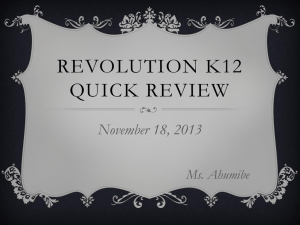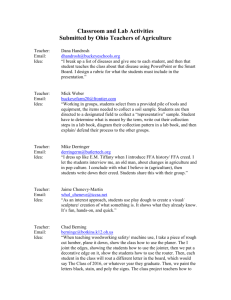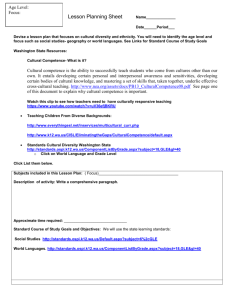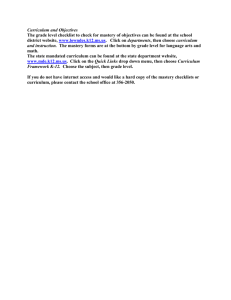Third Grade
advertisement
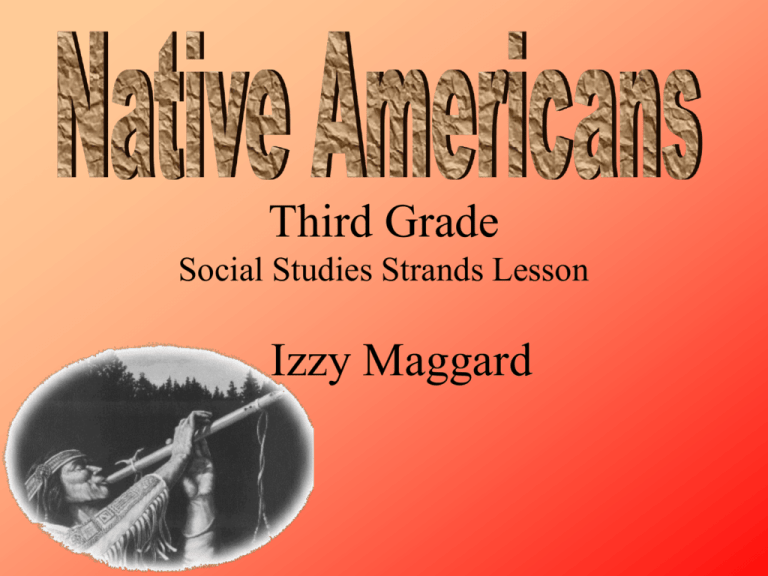
Third Grade Social Studies Strands Lesson Izzy Maggard • • • • • • • American Heritage & People in Society….3 - 6 People in Societies………………………..7 - 10 World Interactions………………………..11 - 14 Citizenship Rights & Responsibilities……15 - 18 Democratic Processes……………………19 - 22 Decision Making & Resources…………..23 - 26 Science, Technology, & Society…………27 - 30 1. The students will create a time line by mapping out the earliest Native American group to the most recent. This will be done on a roll of adding machine paper so the students will be able to see the relative time placement of these Native American Groups. 2. The students will be assigned a tribe to research. They will make a symbol representing their tribe and draw it on sand paper. Once complete the symbols will be used to make an ancestor quilt. 3. The students will examine artifacts of Native American life as well as pictures to get a sense of how they lived. Afterwards the class will play a Native American artifacts bingo. 4. The students will make up a rain dance and have rain sticks to go along with their dance. For this strand they will write down the directions to their dance and read them to the class. 5. The students will create a ceremonial face, to do this they will be using a paper plate, feathers, and construction paper. http://www.anthro.mankato.msus.edu/prehistory/settlements/index.shtml http://www.ilt.columbia.edu/k12/naha/natime/html http://cybersleuth-kids.com/sleuth/History/Native_Americans/ http://philkon.tripod.com/ http://www.kstrom.net/isk/schools/kidpage.html 1. The students will come up with Native American names that describe themselves. I will give them examples like, “Reads Like Fire” or “Writes Fine with Stick.” 2. I will read the story “The Turtle Story” to the class. They will then write their own tale about a Native American tribe. These tales should provide an explanation for a natural phenomena. 3. The class will read aloud Native American tales. After reading they will be able to choose their favorite to illustrate and share with the class. 4. The class will be divided into groups, the students will have to estimate the amount of kernels are on a corn cob. Then the group will counter count the actual number to see which group is the closest. 5. We will explain and discuss the importance of teepees and wigwams. The students will create their own table-top version. http://www.conexus.si.edu/dine2/?pos-99999 http://www.mce.k12tn.net/indians/index/htm http://www.mce.k12tn.net/indians/famous/pocahontas.htm http://www.germantown.k12.il.us/html/homes/html http://impurplehawk.com/ http://www.nps.gov/moja/mojahtm1.htm 1. The students will read stories that have real life problems similar to problems that were faced by Native Americans. 2. The students will create a map of their house using Native American symbols which will be displayed in the classroom. 3. After learning about the Trail of Tears the students will, on a blank map of the U.S. trace the route taken by the Native American Tribes on the Trail of Tears. 4. The students will create a list of at least three reasons why the Native Americans chose to live where they did. After the students have created a list the class will compile all of the reasons into a class list. 5. The students will write a short story describing how a native American child from the past would deal living with the differences in today’s society. http://www.campus.northpark.edu/history/WebChron/NorthAmerica/Hopewell.html http://infomine.ucr.edu/cgi-bin/search?k12 http://www.cviog.uga.edu/Projects/gainfo/trailtea.htm http://www.ohiojunction.net/hopewell/resources.html http://digital.library.upenn.edu/women/zitkala-sa/stories/stories.html 1. Each student will be assigned a poem out of the book “The Desert is Theirs.” The students will then illustrate their poem and will then place them in a class book to be read at the convenience. 2. The class will create a mural of a Chumash Village with paint, they will then include a Pow Wow Circle. 3. As a class we will make succatash and the students will try it. We will then take a vote by creating a graph on how many students liked it versus how many disliked it. 4. The students will construct a bulletin board displaying the information they know on the Native American tribes and the distinguishing features. This will include food, government, housing, and travel. 5. The students will be asked to write a narrative story from the perspective of a Native American Indian Chief. They will be encouraged to write about the problems they face and how they went about solving their problems. http://www.thehistorynet.com/THNarchives/americanhistory/ http://collection/histus.html http://www.ilt.columbia.edu/k12/history/aha.html http://intergate.cccoe.k12.ca.us/mdtech/nativeamerican/ http://www.lib.utexas.edu/libs/pcl/map_ http://www.nativetech.org/food/index.php 1. The students will learn about the authority roles in Native American tribes. They will then try to find an equivalent authoritative position in today’s society. 2. The students will use higher order thinking skills to discover why the Native American community united towards a common goal. 3. The students will learn about what was considered breaking the law in the Native American community as well as what the consequences were for those crimes. 4. The students will choose a member of the Native American community and come up with responsibilities of the individual for their position in the community. Once finished the students will present their findings to the class. 5. The students will role play a tribal council meeting with each student playing the role of a specific tribal position in the Native American community. http://nav.webring.yahoo.com/hub?ring=natg http://www.gorp.com/gorp/resource/us_nhp/Oh_hopew.htm http://www.minnow.net/link9.html http://www.coquilletribe.org/Tribalcourt.htm http://www.mohegan.nsn.us/tribe/s100.html 1. As a class we will read the book “The Legend of the Indian Paintbrush” and watch the video. The students will look for similarities and differences in the book and movie, and write about which one they liked better and why. 2. In a group of four the students will create and build their own Native American village. 3. The class will go on a nature walk to collect materials to create and design jewelry or a costume worn by Native Americans. 4. The class will create ceremonial instruments, such as a drum or rattles. These will be designed using milk cartons or paper towel rings and beans or rice. Each student will personalize theirs by decorating them. 5. The class will write a story from the perspective of a Native American child. They will describe what chores they do and how they meet their needs. http://members.aol.com/drxdonnhistory/american.html http://hanksville/phast.umass.edu/misc/namusic.html http://www.tqd.advanced.org.3081/ http://indy4.fdl.cc.mn.us/~isk/stories/stories.html http://www.nativetech.org/beadwork/index.php http://www.store.yahoo.com/arizonaindianjewelry/?source=Overture 1. The students will participate in a archeological dig in the classroom. In this dig, the students will find arrowheads, pieces of pottery, and other Native American artifacts. 2. The students will pick a topic related to Native Americans and research it on the internet. Here they will find at least three different sites. 3. The students will create a fictional Native American story using Hyperstudio on the computer. The information used in the story should be material that the students learned from previous Native American lessons. 4. The students will go to http://www.nativetech.org/games/index.php and play one of the online games with information about Native Americans. 5. The students will research animal tracks that the Native Americans hunted. Each student will participate in tracking different animal tracks through the school. http://www.ac.wwu.edu/~skywise/legends.html http://www.ajkids.com/ http://www.techresource.srvusd.k12.ca.us/TR/HyperStudio/hyperstudioinf o.htm http://www.nativetech.org/games/index.php http://www.geocities.com/Yosemite/Rapids/7076/ http://www.nativetech.org/
